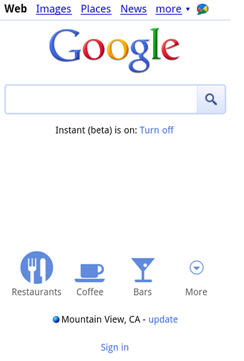Even though it’s the undisputed leader in search, Google isn’t sitting still. It can’t. Unlike email services or social networking sites, users don’t have a great deal invested in which search engine they use so – as former search leader Alta Vista found out when Google hit the scene more than a decade ago — users can and will switch search engines if a better one comes along.
So, with some fanfare, Google summoned journalists to the Yerbe Buena Center in San Francisco on Tuesday to attend “Inside Search,” to learn about how the company is innovating to keep up or ahead of the competition.
Mobile search

One of the first areas they talked about was mobile search which has seen a “5X” growth over the past two years and has different patterns than desktop search. For example, there is a bit of a dip in desktop search around noon but a small bump in mobile search, perhaps because people are away from the office, using their phones instead of their PCs. And while desktop search tends to peak in the afternoon, mobile search peaks at night. Another difference is that mobile actually increases during the summer and Christmas periods when desktop search tends to decline.
But despite the growth of mobile search, there remain some obstacles, not least of which is the fact that few of us are as comfortable typing on our mobiles as we are on our PC keyboards. To improve that experience, Google announced improvements to its speech recognition engine as well as changes to its mobile search to enable users to find what they are looking for with fewer keystrokes or “taps.” The beta version of mobile search that Google released today adds a plus icon next to results that allow people to get more granular information on their query by taping on a suggested result rather than having to type in an additional search query. There is also now a preview option which helps eliminate clicking on the wrong link by giving you a preview of what to expect before you click.
Also, mobile search now has icons for restaurants, coffee shops, bars and other nearby points of interest.
Google has long had voice search on iPhones and Android phones and is now adding voice to desktop search. One reason for this is to get users used to the idea of having voice available everywhere in the hope that people will get used to it and use it more on mobile devices where it makes the most sense. The new feature will initially be available in Google Chrome browser where users will see a microphone icon that they can use to activate voice recognition.

Also new to Chrome will be the ability to search via images. Users will be able to drag an image from their desktop to have Google try to recognize it and search accordingly. An example given at the press conference was a blurry picture taken on a Greek island. Few people would recognize the island from the picture, but Google was able to compare with all the images of that island that its image search has already indexed and recognize where the picture was taken. Image recognition is not being configured to recognize faces or pictures of the exterior of private homes however, in response to reporters’ questions, Google executives pointed out that its pattern recognition algorithms might be able to pinpoint images of famous people or well-known buildings because even though its pattern recognition is content agnostic, it can identify any image if there are enough examples of it on the web.
For desktop users, the most interesting announcement is what Google is calling Instant Pages that, literally, bring up search results instantaneously. The way it works is that as you search, Google starts to figure out what you’re looking for based on the characters you’ve entered and once it’s pretty sure it knows what you want, it starts to download or “cache” that page. Once it’s sure it presents the page which can be even before you’ve finished typing the query. In an example at the press conference, the Washington Post page loaded immediately (as in zero seconds) compared to 3.2 seconds without the Instant Pages turned on.
Click here for archive of my live blog of the Google Inside Search event
Be the first to comment